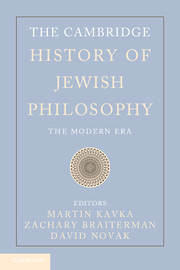Book contents
- Frontmatter
- Contents
- Contributors
- Acknowledgement
- Introduction
- I Judaism's Encounter with Modernity
- 1 Enlightenment
- 2 The Spirit of Jewish History
- 3 Phenomenology
- 4 America
- 5 Feminism and Gender
- II Retrieving Tradition
- III Modern Jewish Philosophical Theology
- IV Jewish Peoplehood
- V Issues in Modern Jewish Philosophy
- Bibliography
- Index
5 - Feminism and Gender
from I - Judaism's Encounter with Modernity
Published online by Cambridge University Press: 28 September 2012
- Frontmatter
- Contents
- Contributors
- Acknowledgement
- Introduction
- I Judaism's Encounter with Modernity
- 1 Enlightenment
- 2 The Spirit of Jewish History
- 3 Phenomenology
- 4 America
- 5 Feminism and Gender
- II Retrieving Tradition
- III Modern Jewish Philosophical Theology
- IV Jewish Peoplehood
- V Issues in Modern Jewish Philosophy
- Bibliography
- Index
Summary
FEMINISM AND JUDAISM
By the end of the twentieth century, feminism had transformed all aspects of society and culture in the West. Whereas first-wave feminism of the late nineteenth century focused on civil rights for women with an emphasis of the right to vote, second-wave feminism emerged in the 1960s, demanding equality in social relations between men and women. Second-wave feminism also generated robust theoretical analysis of the causes of the oppression of women and proposed solutions to it. As feminism matured intellectually during the 1970s and 1980s, it became clear that what is at stake is not just amelioration of the status of women in all walks of life but the cultural expectations from and social roles assigned to women and men. Thus the distinction between sex (i.e., biological differences) and gender (i.e., socially constructed expectations) came to be articulated. In a patriarchal society, gender and sex overlap: a given trait or mode of behavior is considered “masculine” when it relates to power, control, and prestige; conversely, traits associated with marginal social locations are considered “feminine.” Gender analysis thus explores how the categories of “masculine” and “feminine” operate in culture, highlighting the inherent inequality and injustice of gender-based social practices. As gender became the main analytical tool of feminist discourse, academic programs changed their title from “women's studies” to “gender studies,” but the field has become quite contentious since “equity feminism” was differentiated from “gender feminism.”
- Type
- Chapter
- Information
- The Cambridge History of Jewish PhilosophyThe Modern Era, pp. 154 - 190Publisher: Cambridge University PressPrint publication year: 2012

